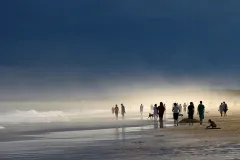Be Kind to the Beach

Ah, summer (in the northern hemisphere, anyway). For me, despite growing up in land-locked cowboy country, the word summer has always been synonymous with beach. It’s that time of year when bathing suits come out of hiding, and we make our annual pilgrimages to visit the sun, the sand, and the surf. Humans tend to think of the beach as a playground, but our shorelines—whether sandy or rocky, fringed with coral reefs, mangroves, or pines—are also sensitive ecosystems and wildlife habitat. The U.S. Life Saving Association estimates that more than 311 million people visited U.S. beaches last year—a number that has grown by more than 50 million visits in the past five years. Besides making lifeguards’ jobs more challenging, this growing number of visitors (as well as a ballooning population of coastal residents) and can take its toll on coastal areas. Actions that seem small, like dropping a piece of litter or cutting across a sand dune instead of taking the designated walkway, can add up to big problems when repeated by millions, or even dozens, of people. Our coastal waters are heavily impacted and face many threats on an ongoing basis. Surely we can show some respect by recreating responsibly when we visit in person.
There are many things sunbathers can do to make a positive difference. Apply the old adage “take only pictures, leave only footprints” and be kind to the beach during your visit. Become a citizen scientist for the day, and contribute to one of these ongoing projects aimed at better understanding the ocean and our impacts on it:
- The Ocean Trash and Treasures group on Flickr—We can learn a lot about the ocean by monitoring the fascinating things that wash up on shore. Check out some of the beautiful and bizarre objects that have been found so far, and submit your own finds.
- Jelly Watch —Swimmers know jellyfish for their stinging tentacles, but beached jellies can be an important clue about what’s happening beneath the waves offshore. Help gather data by reporting stranded jellies to the Monterey Bay Aquarium Research Institute.
- International Pellet Watch —Marine plastic pollution is a growing problem, and tiny pellets called “nurdles” that are used to make consumer goods are getting into the ocean before they have even made it to the factory. Help scientists who are collecting nurdles from beaches around the world and studying the pollutants that collect on their surfaces.
- Finally, if you and your family take beach-friendly actions on the sand or back home, document them and share them with our Motion for the Ocean Flickr group. Everyone needs inspiration from time to time. Help us visualize what it looks like to be ocean-friendly.
So this season, as you unfurl that beach towel on the sand or snorkel over that beautiful patch reef, please keep in mind that your actions can have an impact—positive or negative—on the places you love to visit. Got a favorite ocean book in your beach bag? We’re looking for some good books about the sea for our summer reading list. Share your favorite reads and why you love them.

